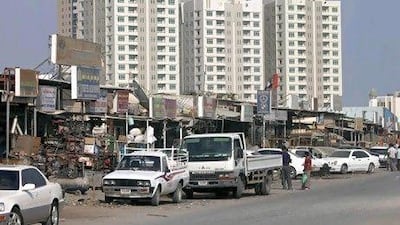The Federal Government will improve the quality of life of nationals in the Northern Emirates through job creation and infrastructure projects, the Minister of Economy said.
Unrest across the Middle East showed the UAE was right to prioritise helping that region of the Emirates, said Sultan al Mansouri.
"There is a real focus on creating projects in Fujairah, Ras al Khaimah, Ajman and Umm al Qaiwain because of the guidelines from the leadership that the quality of life enjoyed by Abu Dhabi has to be also reflected in other emirates. This is exactly the policies we are working on now," Mr al Mansouri said yesterday.
Small and medium-sized enterprises will be the main focus of plans to generate employment in the region, he said.
With few large government-related companies and other big employers operating in the Northern Emirates, small business, industry and agriculture are the main drivers of the economy.
The focus on the Northern Emirates intensified after Sheikh Khalifa, President of the UAE, in February ordered a full evaluation of the region's services and infrastructure.
The IMF last month urged the Government to consider cash handouts to some of the poorest households to replace subsidies on water and electricity.
Unemployment is about 13 per cent, with the scale of joblessness most pressing in the Northern Emirates.
Mr al Mansouri said there were no plans to relocate government departments to the region, a move also recommended by the IMF to help to create jobs.
The recent nationwide extension of the remit of the Khalifa Fund to Support and Develop Small & Medium Enterprises, an Abu Dhabi Government-backed initiative to fund entrepreneurs, was a prime example of how to generate jobs in the region, he said.
Residents have highlighted improvements to public services as an important need. The Government last month promised to spend Dh5.7 billion (US$1.55bn) to provide water and electricity to homes and shops in the Northern Emirates.
"There are infrastructure and projects and plans in certain areas and some will be completed this year like the major roads and networks going to Fujairah for example," Mr al Mansouri said.
There was an increasing amount of co-ordination between Federal and local authorities to improve the quality of life in the region, he said.
Umm al Qaiwain is expected to announce tomorrow a strategy aimed at revitalising its economy.
Asked if there were likely to be further projects in the pipeline in the Northern Emirates, Mr al Mansouri said: "I would not be surprised if there was more as the Government is keen to move ahead with providing jobs for nationals. That can only be achieved if there's a clear strategy of job creation in the northern region."
Sheikh Mohammed bin Zayed, Crown Prince of Abu Dhabi and Deputy Supreme Commander of the UAE Armed Forces, toured the Northern Emirates in February to determine the needs of citizens.
The recent attention given to the region was not spurred by recent turmoil in the Middle East, said Mr al Mansouri. Proposals to improve the economy had been in place for the past two years, he said.

